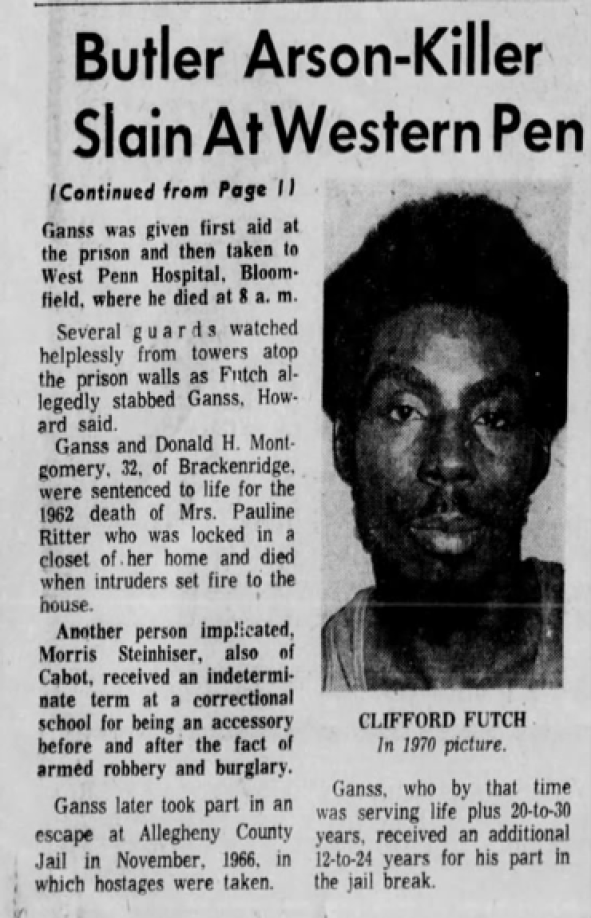Clifford Futch was serving a life sentence in Western Penitentiary for the August 22, 1970, robbery murder of Milton R. Szczepanski, 56, a patron in Ralph Grossi’s Lounge on Penn Avenue in Lawrenceville, when he stabbed and killed fellow inmate, Charles C. Ganss, Jr., on February 26, 1975.
Pittsburgh Press, February 26, 1975
Ganss was serving a life sentence for the January 20, 1962, arson-robbery-murder of Pauline Ritter in Cabot, Butler County, committed with 19-year olds, Donald Montgomery and Morris Steinhiser. Ganss was only 17 at the time.
At trial for killing Ritter, Ganss was convicted of first-degree murder and sentenced to death. Montgomery was also convicted of first-degree murder and sentenced to life imprisonment. Steinhiser was convicted as an accessory and sentenced to 12 years confinement.
Granted a retrial on June 18, 1964, after the court found that a juror had prejudged the case, Ganss pleaded guilty and was sentenced to life imprisonment.
At trial for killing Ganss in July 1975, Futch argued he was in another area of the prison at the time of the killing. Several prison guards testified to having witnessed him stab Ganss. With Futch denying any involvement and the state’s case relying on guard eyewitnesses, no motive for the attack was ever established. Futch’s strong sense of racial mistreatment, growing Black militancy, and a Pittsburgh Courier report (September 11, 1976) point toward the possibility of a racial motive.
Futch, who had an extensive criminal record, was convicted of first-degree murder by an all-white jury on July 27, and sentenced to death on January 16, 1976. His was Allegheny County’s first death sentence imposed after the passage of the state’s new, post-Furman death penalty statute.

Futch’s original conviction was overturned on November 24, 1976, due to the court’s failure to allow race-related questions of prospective jurors during jury selection (Commonwealth v. Futch, 469 Pa. 422, 1976) and a retrial was ordered.
After being ruled incompetent to stand trial, Futch was sent to Farview State Hospital, embroiled in controversy related to the mistreatment of prisoners, for observation. While there, he and another inmate, Russell Shoatz (also Shoats), a Black Panther Party member and self-described political prisoner, used smuggled weapons to escape. They were apprehended two days later, March 4, 1980, after a shootout with police.

Once his retrial was allowed to proceed, Futch argued again that the jury selection process was racially tainted. The trial court agreed that he had made a prima facie case for that claim, which prevented the case from going to the jury. The state appealed and the Pennsylvania Supreme Court ruled that the evidence was insufficient to conclude that impermissible racial bias had occurred (Commonwealth v. Futch, 492 Pa. 359, 1981).
Retried again, Futch was acquitted of Ganss’s murder on October 10, 1981. Questions about racially-motivated mistreatment of Futch dogged efforts to convict him, as did the larger issue of “of a longstanding prosecution practice of systematically excluding blacks from juries” (“Lifer Acquitted in Prison Stab-Death, Pittsburgh Post-Gazette, October 12, 1981).

Futch’s legal saga continued with his April 1982 conviction and life sentence for his 1980 escape.
Now more than 70 years old, Futch remains in prison. Throughout his lengthy imprisonment, he has repeatedly challenged the conditions of his confinement, disrupted the order of prison, and decried the racism of the criminal justice system.
Futch had also appealed his conviction for murdering Szczepanski, alleging an impermissible delay between his arrest and his arraignment. Though the Pennsylvania Supreme Court rejected his claim (Commonwealth v. Futch, 447 Pa. 389, 1972), the case led the state to establish standards for such matters.
Terminally ill with cancer, Russell Shoatz was released from prison in October 2021 and died two months later.




